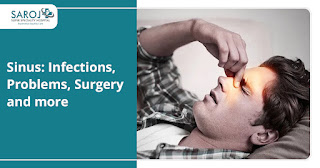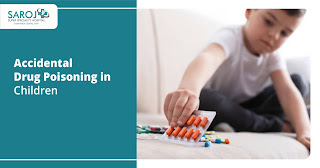Brain tumour is growth of abnormal cells located in the brain. They can start in the brain, or cancer elsewhere in the body can spread to the brain. An estimated 19.3 million new cancer cases have been diagnosed and almost 10.0 million cancer deaths have occurred in 2020. The instances of brain cancer have increased in the last few years, but with upgraded technology and treatment options, the death rate has continuously decreased. Don’t let the fear overcome you, but seek medical guidance immediately if you are diagnosed or you feel that you are showing similar symptoms.
Consult experts at the Saroj Group of Hospitals to know the correct diagnosis of your symptoms, and accordingly find a proper treatment plan.
TYPES OF TUMOURS:
The site where a tumour first starts developing is called a primary tumour. Cancerous tumours also spread to other parts of the body to form secondary tumours.
Some of the brain tumours are listed below:
1.Meningioma- they grow from cells in the tissues that surround the brain
2.Medulloblastoma- malignant tumours that grow in the cerebellum
3.Pituitary tumours- the cells of the tumour may produce large quantities of hormones which can cause various symptoms.
WHAT ARE GRADES OF BRAIN CANCERS?
Not all brain tumours are alike, even if they arise from the same type of brain tissue. Tumours are assigned a grade depending on how the cells in the tumour appear microscopically. The grade also provides information regarding cell's growth rate.
Grade I: The tissue is benign. The cells look almost like normal brain cells, and the growth is slow.
Grade II: The tissue is malignant. These cells look a little less like normal cells in a grade I tumour.
Grade III: The malignant tissue has a distinct appearance. These abnormal cells grow actively.
Grade IV: The malignant tissue has the most abnormal cells and tend to grow at a very fast pace.
SYMPTOMS:
1.Early symptoms may include headaches and feeling sick
2.The symptoms also vary depending on the area of brain that is affected
3.Weakness of muscles in an arm, leg, part of the face, or eyes
4.Problems with balance, co-ordination, vision, hearing, speech, communication or swallowing
5.Loss of smell
6.Dizziness or unsteadiness
7.Numbness or weakness in a part of the body
8.Seizures
9.Confusion
10.Personality changes
RISK FACTORS:
The following factors have been suggested as possible risk factors for primary brain tumours:
1.Radiation to the head
2.HIV infection
3.Environmental toxins
DIAGNOSIS:
Physical Exam: Once you have explained your symptoms to your primary care physician, he asks for your detailed history and examines you and orders for investigations to confirm the diagnosis.
Magnetic resonance imaging (MRI) scan and Computerised tomography (CT) scan: These are some of the gold standards for the diagnosis of cancer. These take images of the soft structures to reveal the exact problem and its location.
PET scan: Positron emission tomography is a test that detects the metabolic activity of the cells as cancerous cells tend to take up more energy and lighting up the scan.
Biopsy: This is a test where a sample of the suspected cancerous tissue will be sent to labs to confirm the diagnosis.
Cerebral Angiogram: This test helps to evaluate the blood flow to the brain.
Other tests if applicable: Depending on the stage, severity and the metastases, other tests may be ordered.
TREATMENT:
It depends on various factors like type, grade, location of tumour and general health of the patient.
Surgery is one of the options of treatment depending on the location of the tumour and its size. Even removing a portion of the tumour may significantly reduce your symptoms. Whereas, Radiotherapy uses radiation to damage the cancerous cells. Chemotherapy is the use of drugs for killing the cancerous cells. Symptomatic treatment is used to manage the pain and to improve the general quality of life of the patient.
As brain tumours develop in integral parts of the brain that control speech, movement, memory and various other important functions, rehabilitation is an important part of the recovery. Depending on your needs, your doctor may refer you to a speech therapist who will help you if you have difficulty in speaking or physiotherapist to regain your motor skills or an occupational therapist to help you with normal daily life activities.








